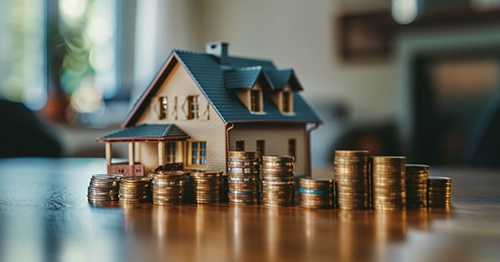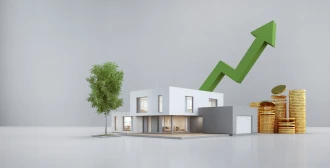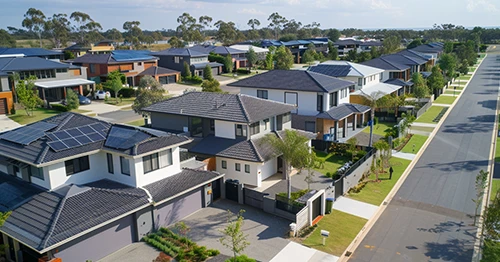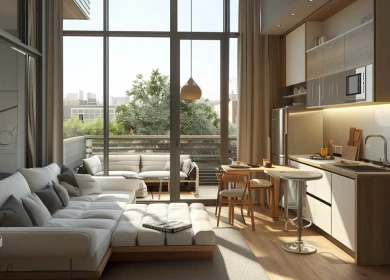Updated: 06 Aug, 2024
Australia’s housing market is still on the rise, despite the lockdowns. However, the rate of growth is losing steam and August marked the lowest monthly rise in housing values since January.
CoreLogic’s national home value index shows housing values grew 1.5% in August 2021. With the August update, housing values are up 15.8% over the first eight months of 2021; they are 18.4% higher than they were 12 months ago. As house prices keep rising, affordability is becoming a greater challenge for home buyers.
“Housing prices have risen almost 11 times faster than wages growth over the past year, creating a more significant barrier to entry for those who don’t yet own a home,” CoreLogic research director Tim Lawless says. “Lockdowns are having a clear impact on consumer sentiment; however, to date, the restrictions have resulted in falling advertised listings and, to a lesser extent, fewer home sales, but less impact on price growth momentum. It’s likely the ongoing shortage of properties available for purchase is central to upwards pressure on housing values.”
What Happened In The Property Market?
Housing values are still on the rise, while inventory levels have dropped sharply in cities where lockdown is in effect. This is, indeed, keeping prices buoyant.
- Capital city houses again recorded stronger growth than units but the gap is narrowing. Throughout the first quarter of 2021, capital cities prices were rising about 1.1 percentage points more than units each month. The gap has now narrowed to 0.7 percentage points in August. This could be a sign of affordability constraints, as units are cheaper than houses.
- The gap is most noticeable in Sydney, where a unit costs almost $470,000 less than a house. Sydney’s monthly growth rate for houses in March was 2 percentage points; it was down to 0.6 percentage points in August.
- There has been a decline in advertised stock levels. In early May 2021, the number of newly advertised properties was 19.7% above the five-year average. In August 2021, it dropped to 5.8% below the five-year average. This was due to lockdowns and seasonal factors.
- The number of home sales dropped 9% nationally over the three months ending in August, compared with the previous quarter. Sales fell by 19% in Sydney and 34% in Melbourne over the same period.
- Despite the drop in sales, housing market activity is above average levels. Even though there are fewer buyers in the market, home sales were 30% higher than the five-year average, at a time when active listings were 29% below the average.
- The upwards pressure on prices is due to low advertised supply and high demand. A large portion of houses sold prior to auction, and those that went under the hammer recorded successful results.
- Vendors are not giving discounts from their initial price expectations.
- Australia experienced the largest rise in rents since 2008 – 8.2% over the 12 months ending August 2021.
- Growth in house rents was higher than unit rents – 9.9% to 4% nationally – over the past 12 months. The weaker growth in units is prominent in Sydney and Melbourne, where overseas migrants and foreign students would normally underpin demand for units.
- With spring selling season approaching, listings are ramping up in Brisbane, Adelaide, Perth and Hobart. The same is not evident for cities in lockdown.
How To Buy When Prices Are Rising
- Get pre-approved for a home loan so you know how much you can borrow, and if there are lenders who can help.
- Seek the help of a mortgage broker to understand your financial situation, including your borrowing power and debt-to-income ratio. If there are any hurdles like low credit scores or a small deposit, the mortgage brokers at Home Loan Experts have access to lenders who can help.
- Know the entire upfront and hidden costs of buying a home. Besides your deposit, you need to pay for stamp duty, council rates, building and pest inspections and insurance.
- For most buyers, if you borrow more than 80% of the property value, you have to pay Lenders Mortgage Insurance. LMI can be paid upfront, capitalised or as a monthly premium. So if you have a deposit that is less than 20%, you can still get onto the property ladder.
- Do not limit your location to one suburb. Expand your search to surrounding suburbs. You might find hidden gems at the right price point.
The first step when buying a house in Australia is to get the right information. At Home Loan Experts, we have a free Home Buyers Course to help you get started. Our mortgage brokers are also here to help. Call us on 1300 889 743 or complete our free assessment form today.





